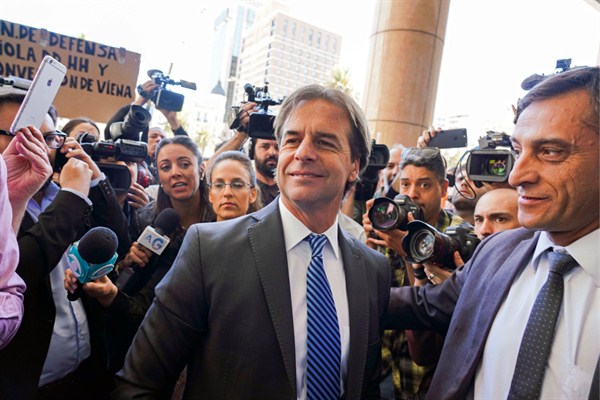Ending 15 years of governing by the leftist Broad Front coalition, Luis Lacalle Pou of the center-right National Party was declared the winner on Nov. 30 of Uruguay’s closely contested presidential runoff. The results of the second-round vote a week earlier, on Nov. 24, came down to just 28,666 votes out of 2.43 million cast, according to the Electoral Court. With turnout at 90 percent, Lacalle Pou, a lawyer, veteran congressman and son of a former president, edged the Broad Front’s candidate, Daniel Martinez, a former mayor of Montevideo, 48.7 to 47.5 percent.
During the Broad Front’s decade and a half in power, it pursued pragmatic economic policies and a series of socially liberal reforms, as poverty and inequality fell. Uruguay’s government is now back in the hands of the country’s two oldest political parties, the conservative National Party and Colorado Party—each founded in 1836—along with a newly formed right-wing movement called the Cabildo Abierto, or the Open Forum. After being knocked out in the first round on Oct. 27, the Colorado Party’s presidential candidate, Ernesto Talvi, and Cabildo Abierto’s candidate, Guido Manini Rios, a retired general, threw their weight behind Lacalle Pou to form a “multicolor” conservative coalition, papering over a range of disagreements and historical rivalries.
In the final days before the runoff, some polls had projected a 9 percent lead for the conservative opposition, so the ultimately narrow gap between Martinez and Lacalle Pou seemed to reflect several factors around the election. A video message issued by Manini Rios to the country’s soldiers on Nov. 14, accusing the Broad Front of having “insulted” the armed forces, may have spooked some Uruguayans. Expatriate voters who tend to favor the Broad Front, many of whom made the short ferry trip from neighboring Argentina to cast their ballots, probably added to the governing coalition’s total. And energetic campaigning across the country since the first round, especially by popular former President Jose “Pepe” Mujica and his party, the Movement of Popular Participation, appears to have rallied the flagging faithful of the Broad Front, which picked up an additional 1 million votes in the second round. The Broad Front will hold 42 seats in the Chamber of Deputies and 13 in the Senate, compared to 54 and 17, respectively, by Lacalle Pou’s disparate coalition.

